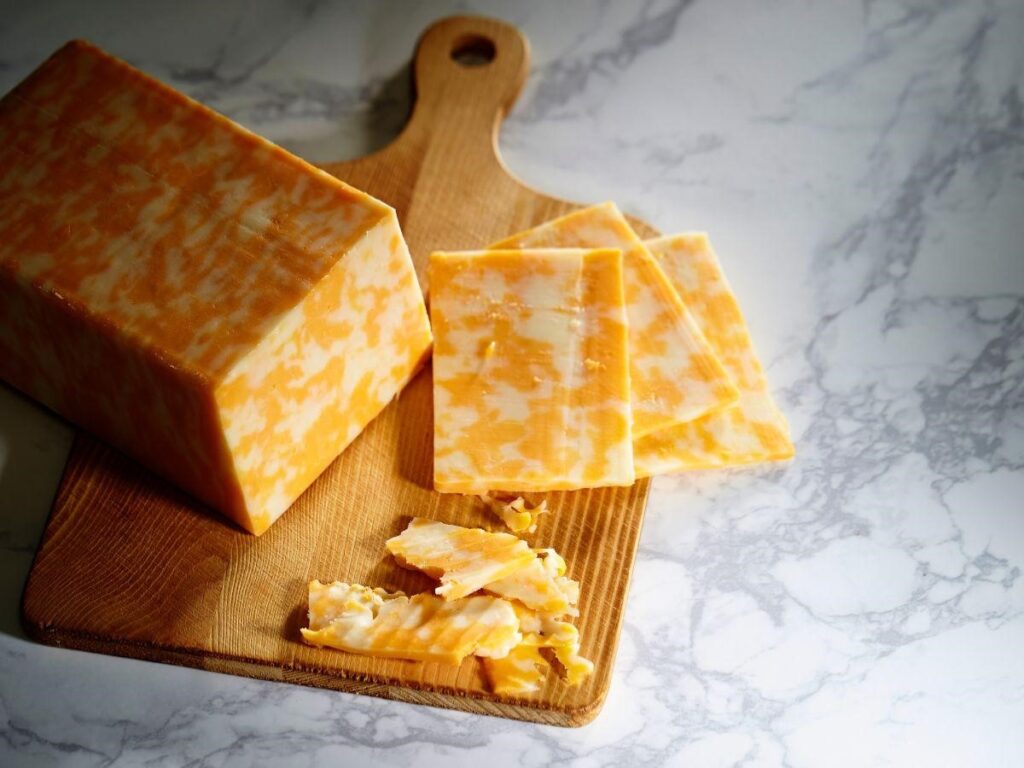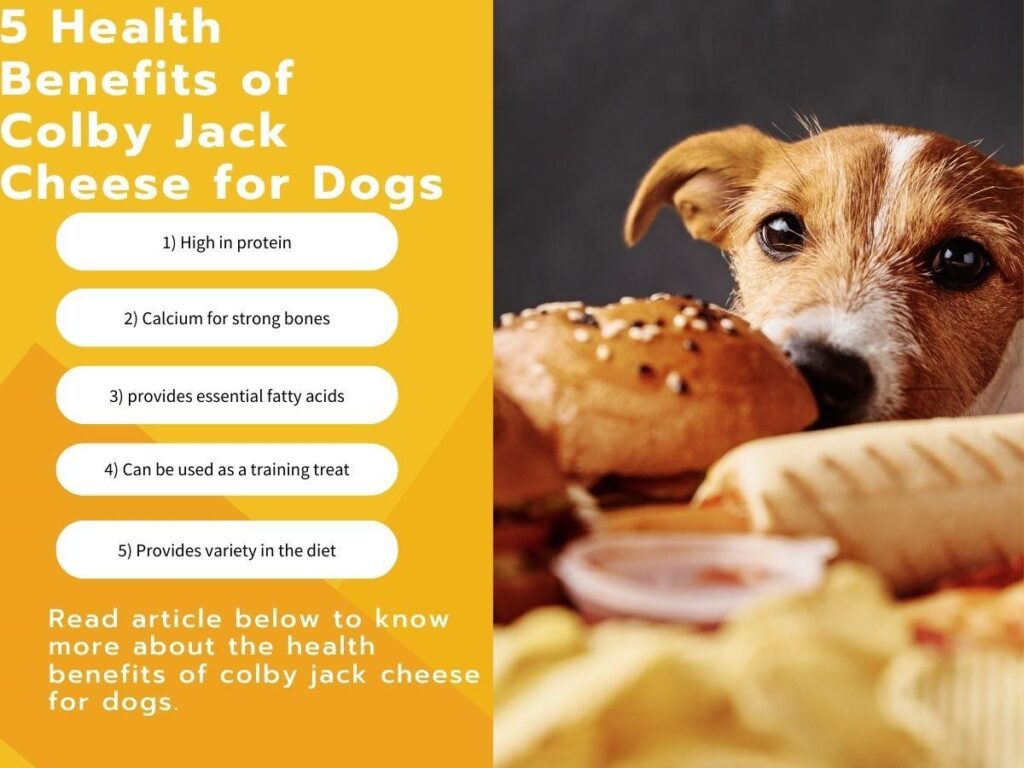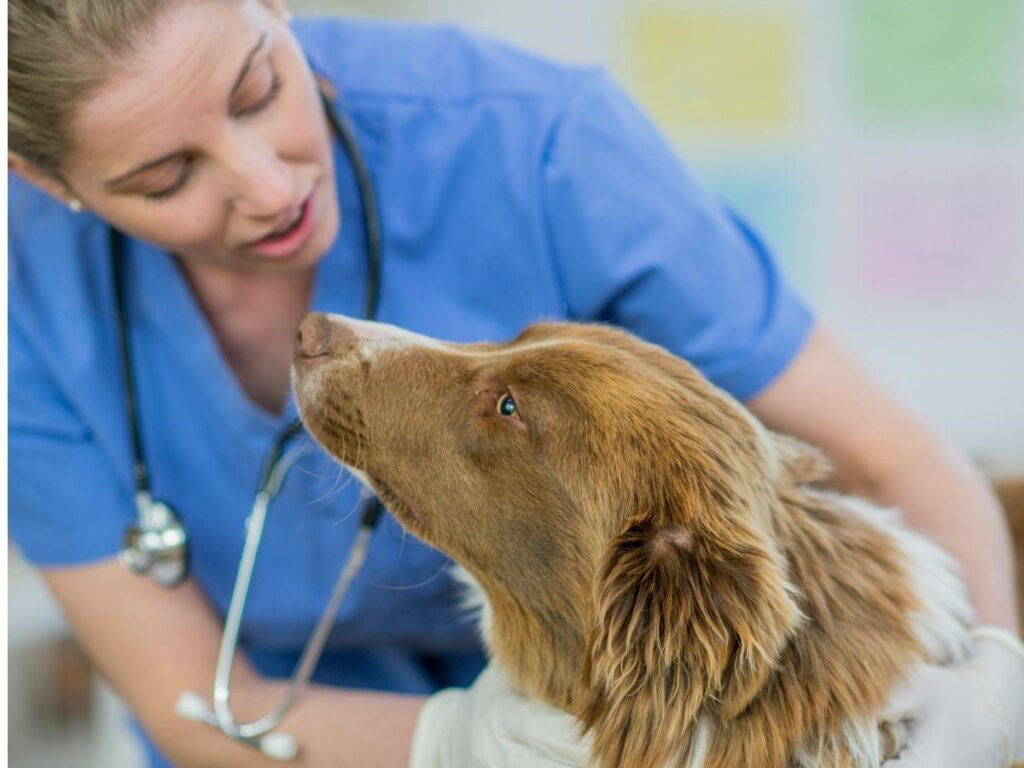Dogs are known to be man’s best companions. They bring us so much joy and happiness that we want to do everything we can to keep them healthy and happy.
We often wish to share our meals with our pets as pet owners, and cheese is no exception. But can dogs eat Colby jack cheese? Let’s find out! The answer is yes but with caution.
Cheese is heavy in fat, leading to obesity and other health problems if consumed in large quantities.
Furthermore, some dogs may be lactose intolerant, resulting in digestive difficulties such as diarrhea or vomiting.
If you wish to offer your dog a bit of Colby jack cheese as a treat, break it into small pieces and watch for any signs of discomfort.
You can also give your dog a small quantity of plain, unsalted cheese to see if they react negatively.
In moderation, dogs can consume Colby jack cheese, but it should not constitute a large portion of their diet.
Before giving your dog any human food, please get in touch with your veterinarian about your dog’s dietary needs and any potential health risks.
Is it Safe for Dogs to Eat Colby and Monterey Jack Cheese?

While cheese is a favorite food for dogs, not all types of cheese are suitable for them to consume. So, can dogs have Colby jack cheese?
- It’s vital to understand that cheese, in general, is high in fat and sodium, which can cause digestive troubles and other health issues in dogs if taken in excess.
- Small amounts of cheese, on the other hand, can be a delightful and nutritious treat for your dog.
- Colby jack cheese is safe for dogs to consume in moderation. Colby jack cheese is a mild-flavored, semi-hard cheese from a combination of Colby and Monterey Jack cheeses.
- Colby jack cheese has a lower fat and sodium level than other cheese forms, making it a healthy snack option for your pet.
- It is still critical to keep portion sizes small and infrequent. Too much cheese, regardless of the variety, can cause upset tummies, diarrhea, and even pancreatitis in your dog.
- It is still critical to keep portion sizes small and infrequent. Too much cheese, regardless of the variety, can cause upset tummies, diarrhea, and even pancreatitis in your dog.
- It’s also worth noting that some dogs are lactose intolerant, which means they have trouble digesting lactose, a sugar in milk and dairy products like cheese.
- If your dog develops vomiting, diarrhea, or other digestive issues after eating Colby jack cheese or any other dairy product, avoiding giving them cheese altogether is better.
- Dogs can eat Colby jack cheese in moderation, but like with any human meal, it’s crucial to keep portion sizes minimal and monitor your dog’s reaction to it.
- Always see your veterinarian if you have any concerns about your dog’s nutrition, as they can provide personalized advice and assistance based on your pet’s particular needs.
Benefits of Colby Jack Cheese for Dogs

It’s normal for a dog owner to want to share some of their favorite meals with their canine companion.
Many dogs appreciate cheese as a treat, and Colby jack cheese is one choice you may investigate. This blog post will look at the benefits of Colby jack cheese for dogs.
High in protein
- Dogs eaten Colby jack cheese. It is high in protein, an important food for dogs.
- Protein aids in forming and repairing muscular tissues, as well as creating hormones, enzymes, and antibodies.
- A small quantity of Colby jack cheese in your dog’s food can assist in guaranteeing that they get enough protein.
Calcium for Strong Bones
- Cheese, notably Colby jack cheese, is high in calcium.
- Calcium is essential for the formation and maintenance of healthy bones and teeth.
- A tiny quantity of Colby jack cheese added to your dog’s food can assist in maintaining bone health.
Provides Essential Fatty Acids
- Cheese is high in important fatty acids, such as omega-3 and omega-6.
- These fatty acids are essential for maintaining healthy skin and coat, immune system support, and brain and eye development.
- A fair bit of Colby jack cheese added to your dog’s food can assist in guaranteeing that they obtain enough important fatty acids.
Can be used as a training Treat
- Colby jack cheese makes an excellent training reward for dogs.
- It’s a high-value treat that many dogs enjoy, and it can be easily divided into little pieces for training.
- As a training incentive, Colby jack cheese may assist in reinforcing positive behavior and enhance your relationship with your dog.
Provides Variety in the Diet
- Including Colby jack cheese in your dog’s food may provide variety and excitement to mealtime.
- Conversely, cheese should be consumed in moderation due to its high fat and calorie content.
Colby jack cheese may be a nutritious and delightful treat for dogs when given in moderation.
It contains protein, calcium, and important fatty acids and may be used as a training reward or to supplement your dog’s diet.
However, it’s vital to note that cheese should never be a dog’s major source of nourishment, and it should always be provided in moderation to avoid weight gain and other health problems.
How Much Colby Jack Cheese can Dogs Have?
Like other forms of cheese, Colby jack cheese should be fed in moderation to dogs.
Cheese is heavy in fat and calories, which can contribute to weight gain and other health problems if consumed in large quantities.
As a general rule, dogs should not consume more than 10% of their daily calorie intake from goodies, including cheese.
The quantity of cheese a dog may safely ingest is determined by their size, age, and degree of exercise.
A little dog, such as a Chihuahua, should only have a small cube of cheese as a reward, but a larger dog, such as a Labrador retriever, can have a little more.
What to do if Your Dog Eats Colby Jack Cheese?

Don’t freak out if your dog gets his hands on some Colby jack cheese! While cheese may be a wonderful treat for dogs, a few precautions must be taken to guarantee their health and safety.
- First, evaluate the circumstance. What percentage of the cheese did your dog consume?
- Is there any leftover packing or wrapping that they may have eaten? It will help you understand the possible hazards and how to proceed.
- Following that, keep a tight check on your dog. Look for indications of gastrointestinal distress, such as vomiting, diarrhea, or lethargy.
- If your dog exhibits any of these signs, call your veterinarian immediately. They can advise you on the best course of action and may recommend bringing your dog in for treatment.
- Meanwhile, you may help your dog’s health by doing a few simple actions. Please encourage them to drink plenty of water, as cheese contains a lot of salt and can dehydrate them.
- To avoid overfeeding, limit their consumption of additional treats or meals throughout the day.
- Even if your dog appears fine, you should always consult your veterinarian. They may advise you on how much cheese your dog can consume and suggest healthier alternatives.
- Remember that prevention is essential! Keep cheese and other snacks out of your dog’s reach to avoid accidental consumption.
- If your dog is particularly interested or naughty, consider installing childproof cabinet latches or storing goodies in a closed pantry.
Conclusion
If you enjoy Colby jack cheese and have a canine companion, you may wonder if your dog would also enjoy it.
The quick answer is yes, but there are certain conditions.
Colby jack cheese is a dairy product with a lot of fat and calories, so offer it to your dog in moderation.
Too much cheese can cause weight gain and other health problems, such as pancreatitis, which can be serious and even fatal.
If your dog exhibits any digestive disturbance after eating cheese, such as diarrhea or vomiting, it is advisable to avoid giving them cheese or other dairy products.
It’s also crucial to remember cheese’s possible choking threat. Small chunks of cheese can easily become caught in a dog’s throat, so chop it into bite-sized pieces or shred it before feeding it to your dog.
While dogs may consume Colby jack cheese in moderation, it is vital to evaluate their needs and tolerance, monitor their consumption, and take precautions to avoid choking or other risks.
You can safely share your love of cheese with your animal pet if you remember these points.
